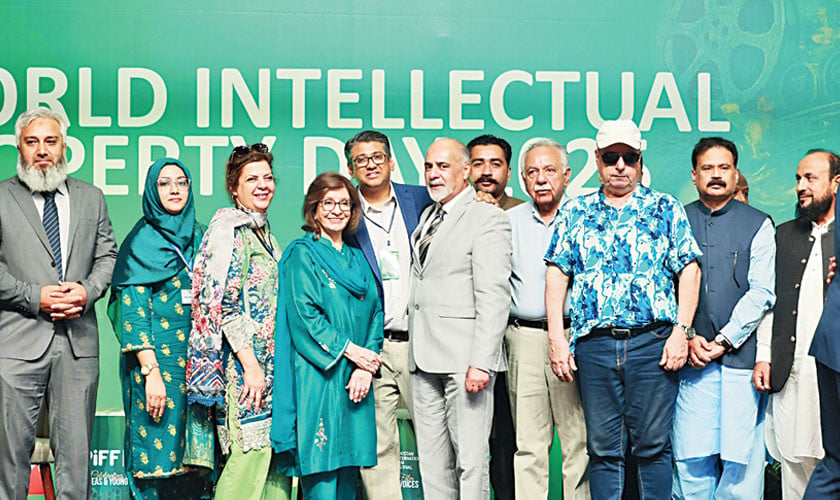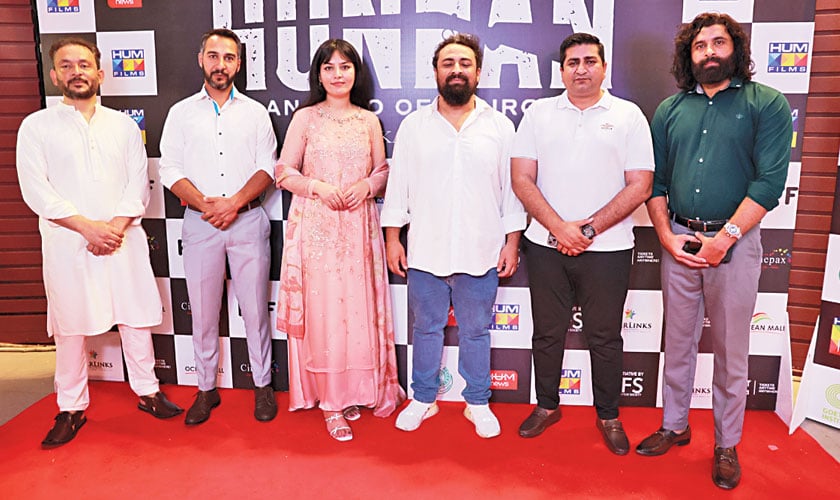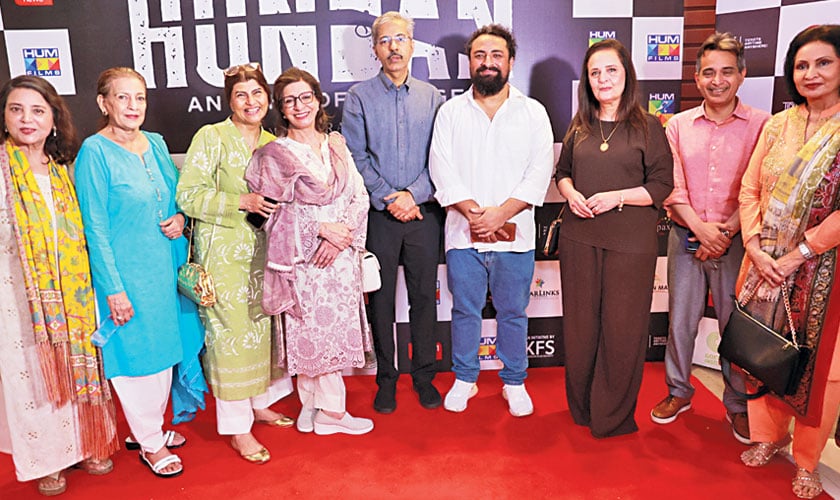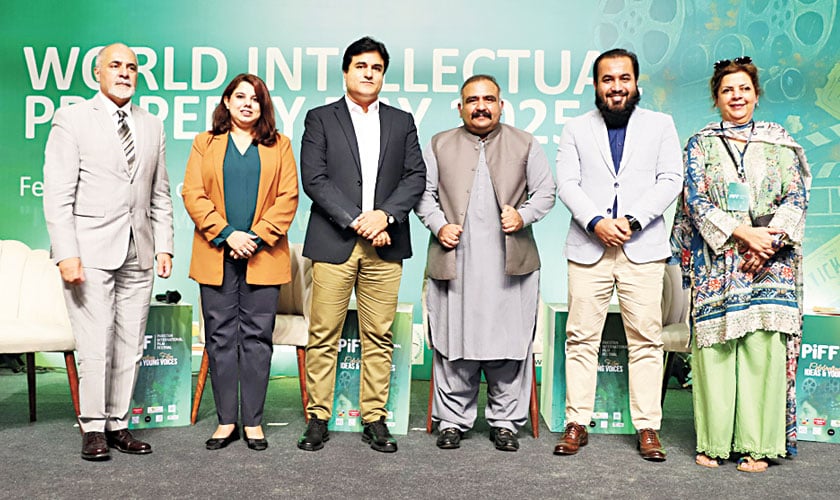film
Art, in all its forms, continues to serve as a mirror to society – shaping narratives, questioning norms, and capturing both the intimacy of individual experience and the pulse of collective history. In a time where technology increasingly intersects with creativity, and where ownership of original work is more complex than ever, conversations around intellectual property have become central to global cultural dialogue.
It is within this transformative phase that the Pakistan International Film Festival (PIFF) 2025 recently concluded in Karachi with a strong emphasis on creativity, innovation, and the evolving dynamics of intellectual property (IP) in the cultural and creative industries. Hosted by the Karachi Film Society (KFS), the festival’s opening day also marked World Intellectual Property Day in collaboration with the Intellectual Property Organisation (IPO) Pakistan.
The event brought together a diverse group of attendees including media professionals, university students, artists, cultural thinkers, and corporate stakeholders. The first day featured discussions around the intersection of technology, law, and creative ownership – particularly in the music and visual arts industries – alongside a celebration of cultural storytelling.
Senior Minister Sindh, Shirjeel Memon, attended as the chief guest, with President Sultana Siddiqui, present as guest of honour. The day was anchored by two panel discussions, each approaching IP from distinct yet interlinked angles.
The first panel, titled ‘Impact of Technology, particularly AI, on Creativity & Ownership of IP Rights in the Music Industry and Creative Arts – Local & Global Perspective,’ was moderated by visual artist and educator Mahwish Husnain. Panellists included Dr Kashif Laeeq, associate professor and data science trainer; Muhammad Jawwad Paracha, a global technology strategist with over 20 patents; PEMRA Sindh’s Director General Tufail Channa; and Faisal Jalal, a Pak-China JV entrepreneur and PhD scholar. Together, they navigated the implications of AI on authorship, creative labour, and policy gaps in local and international contexts.
The second panel discussion, moderated by Syed Nasrullah, was titled ‘Youth, Music & Innovation – How IP Empowers the Arts and Singers’ Community to Secure Ownership and Financial Empowerment of Their Creativity.’ The panel included some of the country’s most seasoned voices in music and IP advocacy. Arshad Mehmood, composer and long-time NAPA mentor, emphasised the importance of institutional support for young artists. Teymour Aslam, COO of the Collective Organisation of Music Rights in Pakistan and a lawyer, explained legal tools available to protect music rights. Baber Sheikh, multimedia artist and director; Nadeem Jaffrey, one of Pakistan’s early music producers; and Umnia J. Iftikhar, founder of Siren and co-founder of Aikman Road Studios, all shared experiences from the production and rights-management side of the industry. Iftikhar noted that “a lack of formal mechanisms for licensing and residuals” continues to hinder growth in the sector. The day concluded with a live musical performance and a networking lunch.
The next three days of the festival centred on international screenings and climate storytelling. In collaboration with Goethe-Institut, two German films were screened following a discussion with PIFF organisers. The first, ‘Beyond the Blue Border’ (2024), directed by Sarah Neumann, depicted the harrowing journey of two East German teenagers attempting to flee across the Baltic Sea. It was followed by ‘Red Sky’ (2023), a Christian Petzold film set during a scorching summer, exploring friendship, envy, and ecological disaster.
Day 3 featured a line-up of three German films. ‘She Chef’ (2023), a documentary following a young Austrian woman through Michelin-starred kitchens; ‘Seven Winters’ in Tehran (2023), a haunting documentary centred on Reyhaneh Jabbari’s wrongful imprisonment and her role as a symbol of women’s resistance in Iran; and the much-anticipated premiere of ‘HunDan – An Echo of a Dirge’ (2025), a Burushaski-language feature.
Directed by a debut filmmaker from Hunza, HunDan explores the emotional journey of a shepherd who, after losing his daughter to pneumonia, kills a protected Markhor and is tormented by ancestral spirits. Set against the dramatic backdrop of the Hunza Valley, the film is being recognised for merging folklore with environmental grief and cultural identity. As the first feature-length film in Burushaski, it stands out not only for its language milestone but also for its striking cinematography and urgent climate message.
The festival concluded on Day 4 with two more German screenings: ‘Greetings from Mars’ (2024), a touching narrative of an autistic child navigating the world through the lens of space travel; and ‘Two to One’ (2024), a humorous yet moving story set in post-unification East Germany. Local animation took centre stage in the final segment, with screenings of ‘The Donkey King’ by Aziz Jindani and ‘The Glassworker’ by Usman Riaz – both highlighting home-grown talent and youth-centric storytelling.
Over the course of four days, PIFF 2025 brought together artists, academics, policymakers, and audiences to engage with pressing questions around ownership, access, creativity, and culture. From panel discussions on artificial intelligence and intellectual property to screenings that highlighted both global cinema and local storytelling, the festival underscored the transformative role of film in reflecting and shaping contemporary discourse. With a strong focus on youth, innovation, and climate storytelling, the event served as both a celebration of cinematic expression and a call to protect the creative rights that sustain it.
– You! desk



